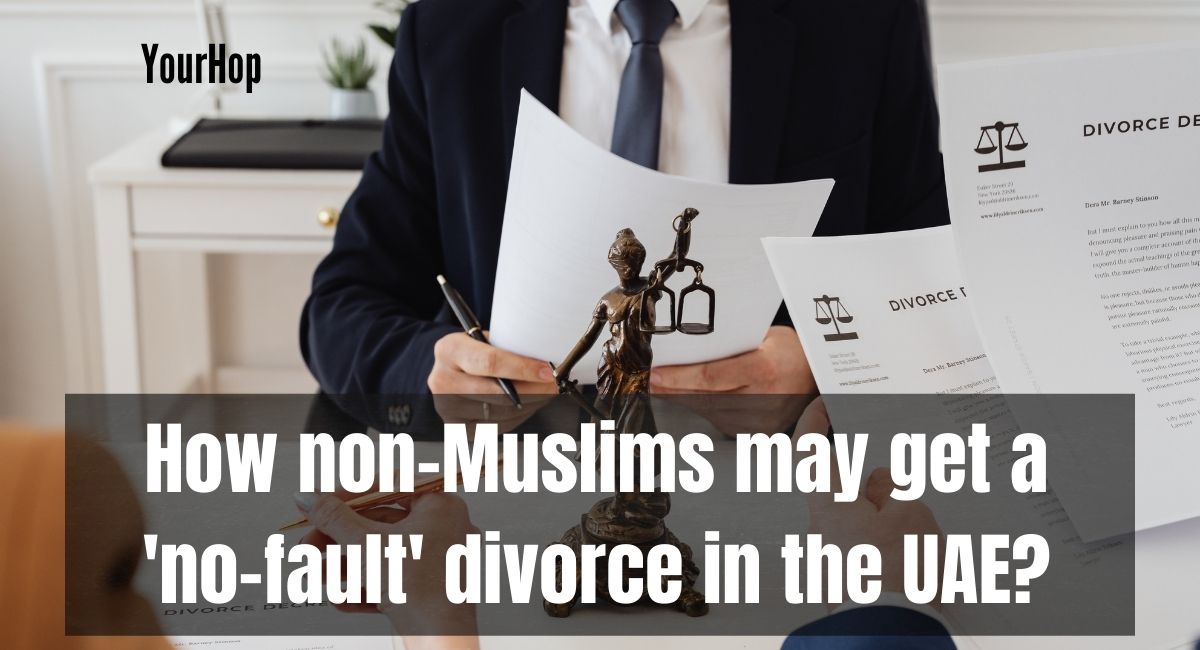In Abu Dhabi, a new non-Muslim Personal Status Court offers legal assistance to expats. Non-Muslims in the UAE may now seek a ‘no-fault’ divorce via Abu Dhabi’s new non-Muslim Personal Status Court, which opened last year. Under Law No. 14 of 2021 on Non-Muslims Personal Status in the Emirate of Abu Dhabi, released in November 2021, the specialized family court for non-Muslims has jurisdiction over personal status cases such as marriage and divorce inheritance and child custody. A ‘no-fault’ divorce is a marriage annulment that does not require either party to establish misconduct. Previously, divorce would be granted if one of the parties was at fault. The non-Muslim family court’s divorce is globally recognized, and the processes are conducted in Arabic and English. The complete regulations and procedures are listed below.
What is the definition of no-fault divorce?
“A no-fault divorce is one in which no spouse is held responsible for the breakup of the marriage. As a result of the no-fault divorce application, the family court will award a divorce without demanding proof of the causes for the marriage’s failure.”
The civil marriage contract is governed by Articles 6 and 7 of Law No. 14 of 2021 issued by President His Highness Sheikh Khalifa Bin Zayed Al Nahyan.
What does it mean?
Couples seeking a divorce may choose a no-fault divorce, which means they don’t have to prove that they are at fault. The divorce procedure has been streamlined — it is no longer required to go before the Family Guidance Committee as a preliminary step; the divorce may now be granted at the first Hearing, saving time and money.
According to the Abu Dhabi Judicial Department (ADJD), a couple that desires to divorce do not need to provide a cause or go through a mediation stage.
Who is eligible to file for divorce?
According to the official website of the ADJD, either the husband or the wife may file for a ‘non-fault’ divorce. However, either the individual submitting the application or the marriage certificate must have been issued in Abu Dhabi. The applicant must complete and submit the ‘No-Fault Divorce Application’ form using the Interactive Case Registration (ICR) service to petition for divorce.
The procedure required for filing of No-fault Divorce
- Completion of Required Formalities
The party asking for divorce will have to complete the English-Arabic Bilingual template with the appropriate papers attached to it and pay the court costs. The court will assess whether the petition fits all the conditions, notably in connection to the court’s authority to rule on the matter. It is always advisable to seek legal advice before filing of any such legal applications before the court.
- Court’s Arrangement for Hearing
If the petition is allowed, the court will arrange a hearing to issue the divorce order after at least 30 days from the day on which the petition was authorized. The parties will be advised of the hearing date.
- The time limit for filing of contention by the defendant
The defendant will have ten days before the Hearing to file a document challenging the court’s jurisdiction.
- Court’s decision on the day of Hearing
The judge will make his decision on the day of the Hearing.
What are the required documents for filing a No-fault Divorce?
The following papers are required to support a ‘no-fault’ divorce application:
- A photocopy of the marriage certificate.
- ID photocopy (passport, Emirates ID and residency visa).
- Employment agreement.
- Bank statements over the previous six months (for all accounts).
How does the new legislation affect alimony or financial claims following a divorce?
According to the ADJD website, if neither spouse can negotiate an agreeable financial settlement after divorce, they may file a post-divorce application for a financial order.
What are the conditions required for ‘No-Fault Divorce?
This rule solely applies to non-Muslims who live in the Emirate of Abu Dhabi.
Unless he shows otherwise, a person is considered a non-Muslim for this legislation if:
- He / She is a citizen of a nation, not a member of The Organization of Islamic Cooperation, unless they confirm otherwise or if the family law of his country is not founded on sharia law.
For candidates possessing the citizenship of a national member of the Arab League countries, an official document proving the individual’s faith could be requested.
What is the provision for Child Custody after Divorce?
Unless one parent waives their right to joint custody, joint custody is automatically applied following divorce. You may also make an application to the court using the child custody dispute form to contest shared custody if you have sufficient grounds. The term “joint custody” refers to a situation in which both parents have custody of their children. It is true in both physical and legal custody cases. Both parents share necessary medical treatment, religious upbringing, and education when they have joint legal custody. The term “joint physical custody” refers to the fact that the child/ren spends about equal time with both parents.
The purpose of this article is to provide an overview of the subject. This article is written with great care to ensure correctness. Because individual circumstances may vary, it is not meant to give legal advice or predict a specific conclusion. Readers considering legal action should seek legal advice from an experienced divorce lawyers in Dubai to learn about current laws and how they may apply to their case. Don’t hesitate to contact us if you require any legal assistance on UAE civil marriage rules or regulations or related issues.






